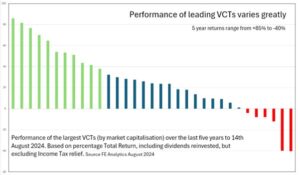
It probably hasn’t escaped your notice that a range of taxes have increased over recent years, in part due to the economic effects of the pandemic. In March of this year, the Office for Budget Responsibility projected that 37.1p in every pound generated in the economy will be subject to tax by 2028. The date of the first Budget for the new Government has been set for 30th October, and media speculation is rife, suggesting potential changes to tax legislation that could increase the overall level of tax take further.
As a result, tax-efficiency is high up the wish list for many investors. The most popular options to increase the tax-efficiency of an investment strategy is the use the annual Individual Savings Account (ISA) allowance, or make pension contributions, which qualify for tax relief. These popular choices are, however, only two of a range of options that investors can consider to reduce the level of tax they pay. Investors who are comfortable accepting higher levels of investment risk may wish to consider Venture Capital Trusts (VCTs), which have grown in popularity over recent years. A qualifying VCT investment can provide a helping hand to small and growing UK businesses, but can also reduce your Income Tax bill, and provide you with a tax-free income stream.
Tax benefits
VCTs were introduced in the Finance Act of 1995, to encourage investment into Britain’s small and entrepreneurial businesses. VCTs are collective investments, with a fixed number of shares in issue at any one time. There are restrictions in place to limit the type of investment that the VCT can make, without risking their qualifying status. These include a £15m limit on the gross assets of the investee company, which must also not have more than 250 employees. In addition, 80% of the holdings within a VCT must be invested in these qualifying assets.
VCTs raise money regularly via the issue of new shares. Purchase of new shares via an offer provides the investor with up-front Income Tax relief of 30% on qualifying investments. This tax relief is retained as long as the investment remains qualifying and is held by the investor for at least 5 years.
In addition to the Income Tax relief, dividends paid by the VCT are tax-free. Most VCTs aim to pay regular dividends, and some actively look to arrange special dividends, in addition to the regular dividend schedule, subject to the performance of the underlying investments within the VCT. Finally, any gains made on disposal of a VCT are also free from Capital Gains Tax.
The need to accept higher levels of risk
It is important to recognise that the Income Tax relief provided on investment in new shares is given as compensation for the investment risk taken when investing in a VCT. As only fledgling unquoted companies qualify for investment, investors need to be aware that individual companies could fail; however, VCT investment has helped a number of household names, such as Zoopla, Secret Escapes, Gousto and Graze, take the next step in their growth story.
Investors in VCTs also need to bear in mind that their investment may be difficult to sell, as there is a very limited primary market. As a result, most VCT managers set aside cash funds within their portfolio to permit share buybacks, where the VCT company buys back shares from investors. Such buybacks are usually set at a small discount to the prevailing net asset value of the underlying VCT portfolio, and larger and more established VCTs offer buyback opportunities regularly. That said, the availability of VCT buybacks is dependent on the trading performance of the VCT, and there is no guarantee that a buyback opportunity will be provided.
Choose the strategy wisely
Given the potential risks and range of outcomes from an individual investment made by a VCT, selecting a VCT with a portfolio approach is of key importance. Generalist VCTs usually invest in at least 20 companies, with many offering greater diversification across a wider range of positions.
There are other variables that can adjust the level of risk within the VCT portfolio. Investee companies that are already established can offer greater stability than those that are at an early stage in the growth cycle. By investing in companies across different sectors of the economy, VCT managers can try and avoid systemic risks affecting the portfolio. By their very nature, most VCT investments will be within companies involved in new technology or e-commerce; however, by adding industrial manufacturers, healthcare and leisure companies, greater diversification can be achieved.
Some VCT strategies add other investments into their portfolio, such as those quoted on the Alternative Investment Market (AIM). Whilst these investments are potentially more liquid, they remain smaller companies that still carry greater levels of investment risk.
Wide variance in performance
Analysing the performance of VCTs launched more than five years ago, shows a distinct variance in performance. Taking into account the initial Income Tax relief, dividends paid during the investment period, and the net asset value after five years, the best performing VCTs have produced an annualised rate of return of over 20% per annum, which is highly attractive; however, this strong performance is certainly not universal. There are a number of sizeable VCTs where the annualised rate of return achieved is between 6% and 8% per annum, which is barely above the level of Income Tax relief available on purchase. A handful of VCTs have fared even worse, losing money over the five year period, and eating into the Income Tax relief gained on investment.

Why advice is critical
Whilst the tax advantages are attractive, it is important to recognise that VCTs are a high risk investment, and should only be considered by investors who are willing to accept a significant risk of capital loss. Whilst many VCTs have produced strong returns over the long term, when factoring in the tax relief on investment and dividend income, others have performed poorly.
Given that this is a specialist market, we recommend seeking independent advice before considering any investment in VCTs, to assess whether a VCT investment is appropriate for your circumstances, needs and objectives.
Our independent advisers can provide you with unbiased and holistic advice to improve the tax efficiency of your investment portfolio, and the FAS Investment Committee has full access to independent expert research on available VCT offers. Speak to one of the team to start a conversation.





